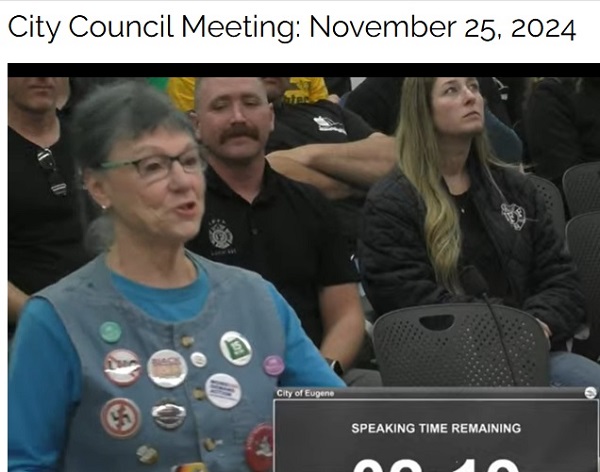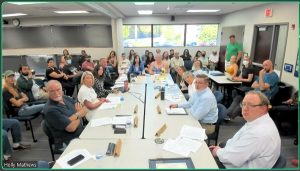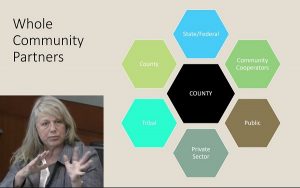City defends fire fee proposal after 2nd round of critical public comment
11 min read
Presenter: The city heard more opposition to what is being called a fire services fee. The new fee would raise $10 million each year to help address a gap between city costs and city revenue. After questioning the fee Nov. 18, firefighters, the Chamber of Commerce, and one Raging Granny returned with more public comment Nov. 25.
Brett Deedon (Lane Professional Firefighters Union, Local 851): My name is Brett Deedon. I’m here tonight as a representative of the Lane Professional Firefighters Union, Local 851. I want to address a statistic that’s been repeated often. Our response times have increased from four minutes to seven minutes, and why this is concerning.
[00:00:37] Let me remind everyone that we are the community’s first responders for both fire and emergency medical services. Every second counts when saving lives and property.
[00:00:48] You know why the national standard for response time is set at four minutes? There’s two reasons primarily.
[00:00:54] First, fire grows at alarming rate. A bedroom fire can grow with a small match to an entire room to be engulfed in flames with temperatures exceeding 1,000 degrees in five minutes. That’s how quickly a fire can get out of control.
[00:01:11] Number two is severe brain injuries. When oxygen stops flowing to the brain, we have four minutes to act to prevent severe brain damage and potentially save a life.
[00:01:22] These are just two examples. We haven’t even touched on the critical response times needed for major traumas, structural collapses, hazmat situations, strokes, fast moving wildfires, overdoses, childbirth complications, and more.
[00:01:38] I understand the budget and funding challenges you face. I’m here to say there is another option for Fire and EMS services, a path forward that requires your leadership. We need you back at the table to advance our governance structure. We have waited too long, and public safety is in danger.
[00:02:00] As our union president, Kris Siewert, said last week: ‘We are tired, we are burnt out, we need help.’
[00:02:08] I love this job, and I can speak for a lot of others in this room, that we love our job.
[00:02:13] We love what we do. But we can’t be, we can’t keep running ragged, Asked to do more and more. With fewer and fewer resources.
[00:02:22] So I want to end tonight with an invitation. I invite each and every one of you to join us for a shift. You can take a couple shifts if you want. Bring your own bedding, your own toiletries, we’ll provide the meals.
[00:02:36] I want you to experience firsthand what it’s like to respond to emergency calls in the community we both serve. He may help you realize the urgency of working together to find a long term solution for a fragile firefighter system.
[00:02:49] Tiffany Edwards (Eugene Chamber of Commerce): I’m Tiffany Edwards with the Eugene Chamber of Commerce. Thanks for your thoughtful, thoughtful deliberations last week on the proposed fire protection fee. That said, a few of you asked that I come back and address the Council with some points of clarification on our position and our biggest concerns as you go into deliberations over the next few weeks.
[00:03:08] Our intention is to be helpful and continue to engage in the conversation. One of the biggest concerns we hear is around the transparency of the fee and what it will be paying for. By labeling this a fire protection fee, the public is likely to misunderstand its purpose.
[00:03:24] Many will assume it represents $10 million in new investment in fire and emergency services. We know that is not the case. With $8 million of the revenue intended to fill a deficit in the general fund and only $2 million will go to enhanced fire services. As proposed, we fear residents and businesses will expect improvements in fire services that simply aren’t resourced with this fee, leaving Eugene Fire challenged with justifying why these enhancements haven’t materialized.
[00:03:52] Second, we believe this approach misses an opportunity to address the root causes in our general fund shortfall. Without a clear evaluation of which departments or programs are underperforming, not aligned with revenues, or less a priority if the public were asked to choose, we risk creating a cycle of short term fixes without solving the underlying issues.
[00:04:13] In two years, we’ll likely face the same budget crisis compounded by other funding needs. Many residents aren’t paying close attention to this proposal, however, they will notice a new fee on their EWAB bill and feel confused or frustrated when they realize what it’s for. We’ll Looking ahead when the CSI renewal comes up, this confusion could deepen.
[00:04:33] Voters might question why additional public safety funding is necessary after what they perceive is a $10 million investment in emergency services and vote it down. Then what? If the council determines that a fee is the right path forward, I urge you to consider renaming it. A city service fee would be more accurately reflect its purpose and help set appropriate expectations for the community.
[00:04:56] We’d also like to see some commitment to engage the community in a priority based budgeting process to help identify and focus resources on what matters most. Transparency and clear communication are essential for maintaining public trust. Missteps now could make it harder to gain support for future needs.
[00:05:14] Virginia Donohue: My name is Virginia Donohue. My husband and I live in Ward 2. I am wearing my Raging Grannies vest to add credibility to my remarks, and to show my concern for many issues facing our world today.
[00:05:30] But today, the issue is close to home and personal. Our son has been with Eugene Springfield Fire and Rescue for over 20 years. and is now a captain of one of the stations. His dedication to this crucial job is second to none. We have all seen the charts and read the shocking statistics that show the unreasonable demands being placed on our firefighters and EMTs.
[00:05:55] The one that disturbs me the most is that of the people hired in the past 10 years, 47% have quit, most to work in other cities where the workload is more humane and the pay is better. That’s nearly 50%. No wonder we have watched our son grow ever more exhausted with each passing year.
[00:06:17] The first half of this month he worked two 120-hour weeks back to back because of forced overtime, with little chance for healthy sleep to recover the physical, mental, and emotional strength needed to answer the continual calls for help. He is not alone in bearing this heavy, unrelenting burden. For all our sakes, we citizens of Eugene must be willing to help our helpers.
[00:06:48] However, I am concerned that the name of the proposed method of raising money is not quite honest. By attaching the label ‘Fire Fee,’ it sounds as if the Fire Department will receive all the money, when, in fact, 80% of it will go to the city’s general fund. I worry that the public will lose trust in city government if you are not transparent in how the money will be allocated.
[00:07:16] I do not oppose the fee as such. Eugene is a fantastic place to live, with parks, police, libraries, and other services all needing our support. Why not call it, ‘Lucky to Live Here’ fee, and then continue to do the budget work needed to properly and honestly fund our fire department.
[00:07:41] Andrew Highison: My name is Andrew Highison and I’m a Eugene resident, and a firefighter paramedic for Eugene Springfield Fire. As our city faces a challenging budget shortfall and seeks to define our financial priorities moving forward, I am here to urge the City Council to prioritize an investment in the safety and security that our community needs.
[00:08:03] We know the statistics that staffing and emergency apparatus have not matched the pace of our population growth, and that consequently, response times have nearly doubled since the 1990s, that frequently, all of our available ambulances are busy, leaving our community members without the essential safety net that they both expect and deserve.
[00:08:25] Essential is the key word here, and our budget priorities should reflect the vital importance of the services the Fire Department provides. Public health and safety is a foundational component of what makes a city livable and what makes a community thrive.
[00:08:41] As a resident, I do enjoy many of the services that the city currently provides. I enjoy those aspects of living in Eugene, but I need fire protection and emergency medical services.
[00:08:54] Tomorrow, I will be working on an ambulance, and experience suggests there will likely be a time in which every medic unit will be committed to a call. During those times, I worry. I worry that a fellow community member will need us, that a friend or a loved one will need us, and we won’t be able to get there quickly enough.
[00:09:13] If a neighbor’s house catches fire, if a friend is involved in a car accident, if my wife or son suffers a catastrophic medical emergency, I need to know that we have prioritized the resources necessary to ensure a rapid and effective response.
[00:09:29] Going forward, please reevaluate the current budgetary structure. And please prioritize the safety and security of our community.
[00:09:37] Tim Rodgers: My name is Tim Rodgers. I’m an engineer paramedic with Eugene Springfield Fire. I’ve served this department for nearly eight years, and I’m currently assigned to Station 1, which houses the busiest fire engine in Eugene Springfield. Engine 1 is also ranked among the top 20 busiest fire engines in the nation.
[00:09:57] I want to take this opportunity to explain why we are urging you to prioritize investments in our fire department. Throughout my career I have witnessed firsthand the devastating effects of chronic exhaustion on our firefighters. I have seen colleagues fall asleep while trying to eat while waiting for their partners to offload patients at the hospital and even while en route to two emergency calls.
On one occasion, while transporting a patient, I saw the driver of the ambulance struggle to stay awake, holding his eyelids open, with the windows down and the radio blasting just to avoid dozing off at the wheel.
[00:10:35] We often told, ‘Speak up’ when we’re too exhausted to continue. But what happens then? Another firefighter must step in to endure the same working conditions, perpetuating the cycle of exhaustion caused by insufficient resources. From 1981 to last year, there has been a 1,003.6% increase in calls for service.
[00:10:59] Yet in over four decades, the number of response units remained unchanged at 12. It’s time to make some significant investments in our fire department, investments that include increasing response resources, retaining firefighters with competitive wages, and developing a long-term funding plan to meet the demands of our community.
[00:11:21] Additionally, if we are going to ask our members to perform advanced medical procedures such as surgical cracks, pleural decompression, endotracheal inhibition, we must ensure they are in the physical and mental condition necessary to execute these life-saving interventions. We need help.
[00:11:41] We’ve been asking for help. No one wants the loss of a firefighter or a loved one to be the wake-up call for action.
[00:11:48] Kris Siewert (Lane Professional Firefighters Union, Local 851): Kris Siewert, president of Lane Professional Firefighters. I think I might be the last firefighter to speak tonight, and so, I just wanted to thank you all very much for listening to everything that we have to say. We really appreciate the time and effort that you put into the work session this last week.
[00:12:02] It was very evident based on the questions and the discussion that you all had, that there’s a lot of interest and a lot of questions surrounding this. We understand that there’s going to be a lot of hard decisions for all of you to make as you make some of those decisions. As you start to make some of those decisions, we really want to stress the prioritization of long-term funding for our fire department and our members.
[00:12:25] There’s been a lot of statistics thrown out from our members. We’ve heard them increase call volume, increase population, not a lot of staffing. The thing to kind of understand with that is, is that stagnation of not increasing our staffing is creating burnout. We’ve reached that toll with our firefighters and it’s now starting to become a retention issue.
[00:12:44] As someone mentioned earlier, our retention issue, our retention numbers are hitting roughly around 40% and above. This is for other departments offering better working conditions, better wages, as well as just walking away from the profession as a whole. The toll that we’re putting our firefighters through, it has to stop.
[00:13:02] We have hit this point where we need resources, we need the support across the board. And as we look at things, as we lose our firefighters, each one of those firefighters has to be replaced. And if we go through and we start looking at the cost-benefit analysis of having to train, recruit and rehire all over again, those funds and that financial impact would be far less if we were just to invest in what we have here now.
[00:13:32] The proposed fire fee estimated at the $2 million benefit for the fire department as well as the additional $8 million is a step forward, but it does fall short of addressing our systemic challenges. It may prevent immediate cuts now, but in the long term, we’ll probably be back here talking about cuts in the future as well.
[00:13:50] Right now we need to prioritize long-term funding, and at 22% funding priority, it just simply isn’t enough. We cannot continue to operate without clear direction or adequate funding. I urge the Council to make the Fire Department a long-term priority in their funding source.
[00:14:04] Presenter: After the public comment:
[00:14:08] Sarah Medary (Eugene, city manager): So the fire services fee, this isn’t the right format to go deeply into it, but the intent always was to do two things.
[00:14:16] As you asked me to: Come up with revenue solutions for the general fund. So that’s accurate. How do we stabilize all of the services across the general fund? One of the other items I was trying to accomplish is trying to create a sort of utility for fire services that would be a long term funding source for fire.
[00:14:35] So in the first year we would take the $8 million of fire services out of the general fund. So that’s true. But then that money is in a special revenue fund that can’t be touched by any other department going forward. So in the long term we’re starting to build some stability in there that is not as subject to the downsides of being in the property tax fund.
[00:14:59] So that’s what the intent was plus $2 million of additional services.
[00:15:03] I totally understand why people are saying it’s just for general fund. But if we called it a ‘City services fee’ and we just make it a city services fee or a ‘Lucky to live here’ fee, then that doesn’t protect and secure that $8 million for Fire going forward. And so that’s really what the intent has been, but I understand some of the confusion around it.
[00:15:22] We’re going to continue to talk about this in future work sessions and you’ll have the opportunity to determine what you want to do with that. But that’s really what the intent is.
[00:15:31] Presenter: With no Plan B, such as reducing the city’s top-heavy management structure, and claiming that the city cannot report where staff actually spends its time, the city appears willing to run out the clock and use the threat of $10 million cuts to help sell what it’s calling a fire services fee, a name that has been called ‘not quite honest.’



